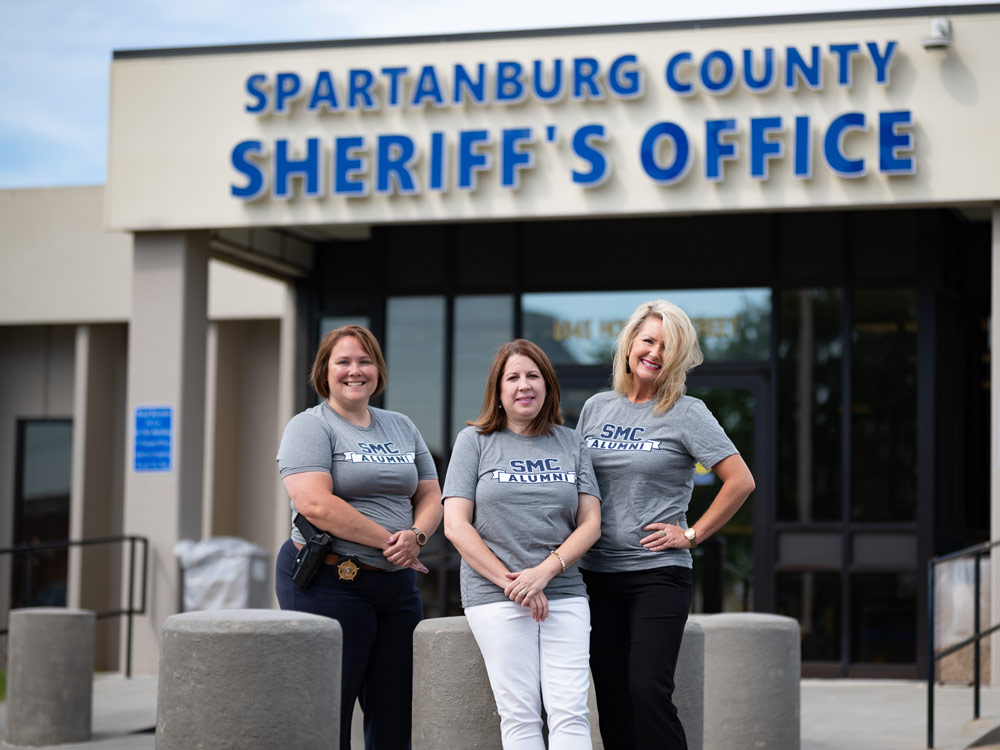Supporting Victims, Creating Survivors
By Baker Maultsby
This article appeared originally in the Fall 2019 issue of Frontiers Magazine.
They provide support and compassion for those in desperate situations. They work to solve issues that are shocking, yet remain hidden to most in their community.
Spartanburg Methodist College graduates Elizabeth Renneker, Zan Raymond, and Donna Phillips work on domestic violence and Special Victims Unit (SVU) cases for the Spartanburg County Sheriff’s Office. “We are there to help people in their worst moments,” said Renneker, a 2003 graduate.
Renneker is an investigator with the Sheriff’s Office. Raymond, class of 1988, and Phillips, class of 1987, work as victims’ advocates.
While Renneker studies cases to determine whether arrests should be made, Raymond and Phillips contact victims to learn about their immediate and long-term needs and to offer support. They work closely with community organizations such as emergency shelters and counseling centers.
Raymond explained, “For investigators, it’s about making the best criminal case possible. Our job is to be there for the victim — holding them and crying with them sometimes, showing kindness and offering hope.”
At the same time, Phillips stressed, “Every person who is a crime victim, regardless of the crime, will have their own individual response in dealing with the experience. One challenge is finding the best remedy that will benefit the victim in coping with the aftermath of the crime and finding their new normal.”
As one might imagine, this isn’t easy work. It can be emotionally taxing. It can leave disturbing images and lead to difficult questions. “Some days are better than others,” Raymond said. “I don’t watch crime shows when I’m at home. I just watch comedy — that’s my coping mechanism.”
Raymond draws perspective and inspiration from her own family’s experience with domestic violence. When she was a teenager, her grandfather killed her grandmother.

Raymond’s family knew that her grandfather would at times become violent. Sometimes her grandmother would leave and stay for a few days at Raymond’s parents’ home in Great Falls, but she always went back.
Raymond hopes for other women to leave for good — or embrace other changes — when it’s necessary for their protection or the well-being of their children. “I want them to understand, ‘You can conquer this. It doesn’t have to be your life.’”
Renneker, meanwhile, is focused on helping victims by seeing criminals held accountable in the court of law. “It’s what keeps you going — getting a case, working the facts, seeking justice,” she says.
Renneker, Phillips, and Raymond each tout their SMC education and the influence the College has had on their lives and careers.
Raymond described Great Falls as a “one stoplight town.” Spartanburg seemed like a big place, and SMC exposed her to new ideas and career possibilities.
For Phillips, who grew up in Spartanburg, academic, and social experiences at SMC helped her to “grow my independence and uncover my desire to serve my community.”
Renneker, who went to nearby Boiling Springs High School, talked about the influence of retired Criminal Justice Professor Lorna Hanson. “She was amazing,” Renneker says. “She’s just a huge role model. She pushed you. She taught you to do the best you can do, to set goals and work hard toward them.”
In addition to domestic violence cases, Renneker investigates cases of alleged abuse or neglect of vulnerable adults. Victims include elderly adults and homeless veterans who have been targets of fraud and exploitation.
Overall, she read roughly 10 police reports a day in 2018. Not each led to an intensive investigation or an arrest, but there was plenty of work for Renneker.
The partnership of Phillips and Raymond is essential to her efforts. Addressing the needs of victims enables Renneker to focus on investigating evidence and building a case. Meanwhile, victims who can find a sense of calm and confidence are likely to be more helpful to police investigators and prosecutors.
And when all of these pieces of the puzzle come together, there’s a better chance for the best possible outcome. That’s what these three SMC graduates are working toward each day.
Phillips put it this way: “My greatest reward is seeing a victim transform into a survivor.”
